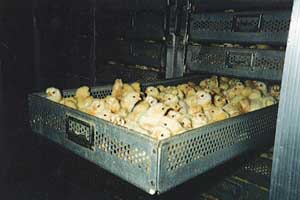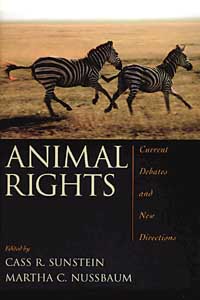Conference at Law School will launch discussion of animal treatment, welfare
By Peter SchulerNews Office
 The Chicago Project on Animal Treatment Principles will kick off with a Friday, Oct. 29 conference at the University. The agenda includes a review of current practices and future directions in animal husbandry and slaughter, labeling initiatives, and the incorporation of animal welfare guidelines into the production process.  Law School professors Jeff Leslie, Martha Nussbaum, Julie Roin and Cass Sunstein are coordinating the Friday, Oct. 29 conference that will feature scholars, animal welfare advocates and industry experts who are involved in the emerging areas of animal rights business and law. Nussbaum and Sunstein edited the April release, Animal Rights: Current Debates and New Directions, published by Oxford University Press. | |
Members of the Law School faculty and other leading scholars and experts will join together at the Law School on Friday, Oct. 29, in an effort to launch a major initiative that examines best practices standards and disclosure guidelines for the treatment of animals in various industries.
A daylong conference will kick off the Chicago Project on Animal Treatment Principles and bring together scholars, animal welfare advocates and industry experts who are involved in the emerging areas of animal rights business and law.
The conference is the first step in a process to generate more information about animal treatment than is currently available to both producers and consumers. The project is funded through a grant from the McCormick Companions’ Fund.
“This conference will help us understand how we should treat animals raised for food,” said Cass Sunstein, one of the project organizers and the Karl N. Llewellyn Distinguished Service Professor in the Law School. The agenda includes a review of current practices and future directions in animal husbandry and slaughter, labeling initiatives, and the incorporation of animal welfare guidelines into the production process.
Joining Sunstein in this effort are Martha Nussbaum, the Ernst Freund Distinguished Service Professor of Law & Ethics in the Law School, Philosophy and the Divinity School, Julie Roin, the Seymour Logan Professor in the Law School, and Jeff Leslie, Assistant Clinical Professor of Law in the Law School.
Sunstein is among the leading scholars in the incipient field of animal rights law, and he and Nussbaum recently co-edited Animal Rights: Current Debates and New Directions, published by Oxford University Press.
Sunstein explained that in recent years industry trade groups and animal welfare organizations have offered competing guidelines on humane treatment of animals raised for food, which often conflict “and unfortunately, speak past one another in an attempt to set standards at widely different levels of generality.
“The development of guidelines and auditing and monitoring regimes are all commendable,” Sunstein said, “but they do not go far enough in providing information to consumers who wish to consider animal welfare in making food purchasing decisions.”
Sunstein explained that even the most transparent of the existing auditing and monitoring regimes do not provide much information unless consumers research the standards and criteria behind the label on the package.
“We should be able to do much better than the confusion and misperception that currently surround this issue,” said Nussbaum, who works on animal rights from a philosophical perspective. “Information for the consumer is woefully inadequate and often poorly presented for an informed decision.”
The ongoing Law School project will develop “Chicago Principles” to assist producers in making animal welfare information accessible to consumers, using easily understood labels and other methods.
“Consumer choice would be greatly enhanced by a move to a more substantive, mandatory labeling regime that focuses on a limited number of clearly defined producer practices with the greatest impact on animal welfare, consumer preferences and firm behavior,” Roin said. “There are obviously feasibility questions—chief among them is cost—which will require further study and analysis, but we believe this is an important and necessary beginning.”
Leslie added: “Disclosure of animal treatment practices in food production is only the first step for the Chicago Project. Over time, we will look at the role that disclosure can play across a variety of industries that use animals in their production processes.”
The conference will be held in the Courtroom at the Law School, 1111 E. 60th St. Two sessions are free and open to the public: the Discussion of Best Practices from 10-11:15 a.m. and the Discussion of Chicago Principles from 3:30-5 p.m.
More information about the Chicago Project on Animal Treatment Principles and the conference can be found at http://www.law.uchicago.edu/policy/animal/conference.shtml.
![[Chronicle]](/images/sidebar_header_oct06.gif)